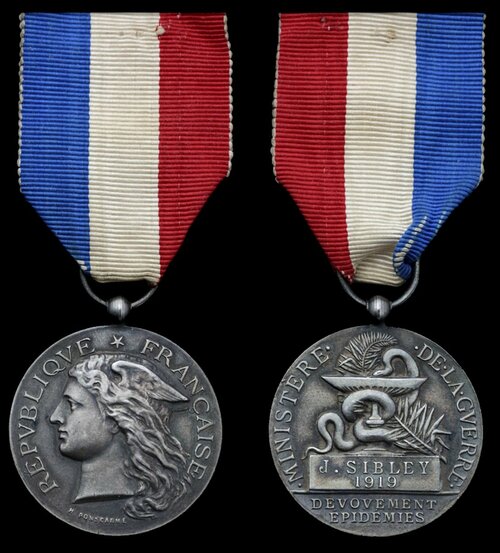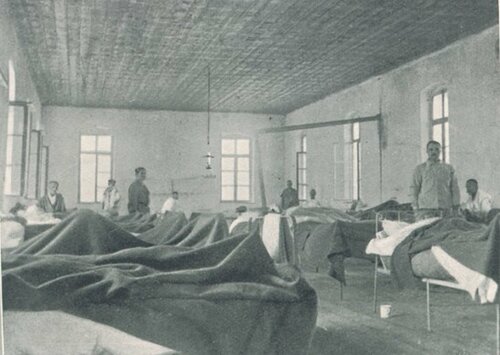Auction: 22001 - Orders, Decorations and Medals
Lot: 331
The French Medal of Honor for Epidemics awarded to Sister Jennie Sibley, Queen Alexandra's Imperial Military Nursing Service, who was one of the original Nurses at Lady Paget's Hospital in Serbia during the Great War before being transferred to Salonica and later France and seeing post-war service in India and Egypt
France, Republic, Medal of Honor for Epidemics, silver (J. Sibley 1919), hallmarked, in named Ministere De La Guerre case of issue, good very fine
Jeannie Sibley was born at St. Neots, Huntingdonshire in 21 July 1878. Having be educated at Prospect House School, St. Neots she moved on to The Royal Hospital, Richmond from training here from October 1909-1912 before transferring to The Middlesex Hospital from 1913-14. She trained here as a Staff Nurse but for the last two months at Middlesex performed the role of a Sister.
Sibley joined Lady Paget's Hospital in Skopje, set up as part of the Serbian Relief Fund, on 6 October 1914. Here she recounted the affect their arrival had upon the exhausted Serbian Armies:
'You can well imagine the depression of the Serbians at this time, especially as they had no ammunition. Our coming seemed to herald in brighter days. Ammunition arrived. Their spirits took fresh hope and in a very short time they were in full possession of Belgrade, having taken thousands of prisoners and gained one of the biggest victories this war will ever know. Lady Paget's Unit is regarded as a mascot, having turned their dark clouds.'
Paget's Hospital was involved in treating both Serbian and Austro-Hungarian casualties of the fighting with a range of backgrounds and languages which initially caused serious problems as none of the patients spoke English. Later also saw cases of typhus as the poor conditions led to serious illnesses. Sibley described the soldiers 'The condition was terrible - many not having been out of the trenches for four days after being wounded.' and these poor conditions were not aided by 'wounds ranking with pus, their bodies covered with lice, and all of them suffering frostbitten feet'. As the fevers worsened many nurses fell ill, even Paget herself, and the intense cold of the Serbian winter did not help matters with over 2,000 Austrian prisoners dying in February 1915. Sibley left Serbia in May 1915, travelling back to England she enlisted with Queen Alexandria's Imperial Military Nursing Service Reserve on 3 July 1915 and saw service on the nursing staff of typhoid hospitals as a Sister. Entering the war at Salonica on 1 July 1916 she described a loud welcome as 'We were under fire seven times during our 1st, 2nd and 3rd week here by hostile aircraft guns.' Sibley remained here until 3 October 1918 when she was evacuated having caught Malaria, ready for posting by 4 November she continued to serve until 5 May 1920 when she was demobilised while working at Reading War Hospital.
Sibley left Britain for Egypt after the war in the service of the Egyptian Government. Handing in her notice when the Egyptian Constitution came into effect in 1923, writing a letter to the Matron-in-Chief of Queen Alexandra's Imperial Military Nursing Service from the Anglo-American Hospital in Cairo stating:
'You will note I have left the service of the Egyptian Government, owing to the Independence + all the changes it involves. I came direct to the above hospital for the winter months. I expect to be back in England by the middle of april.
Knowing my qualifications & my past services with Q.A.I.M.N.S. I wondered if you had anything to offer me after this date or the beginning of the winter months'
Sibley continued to work with them for some time, chiefly at Catterick Camp where her reports stated:
'Miss Sibley arrived for duty here on the 16th of April 1931. Her time since then has been spent chiefly in the (...) facilities Hospital although she has also had charge for nearly two months of Surgical Wards in the main Hospital. Her work in the main hospital was satisfactory on the whole but I consider miss Sibley during the many heavy rushes of work we so often have had, has not always been able to do herself or her work full justice as she has probably not felt at those times physically particularly fit. Her moral qualifications are excellent and she is very punctual always + has pleasant manners'
She was finally removed from the roll on 14 July 1938; sold together with the original document of issue and copied research including printed service papers, a C.D. containing a digital copy and M.I.C. as well as London Gazette entries and a copy of St Neots and the Great War.
Subject to 20% VAT on Buyer’s Premium. For more information please view Terms and Conditions for Buyers.
Sold for
£210
Starting price
£90







